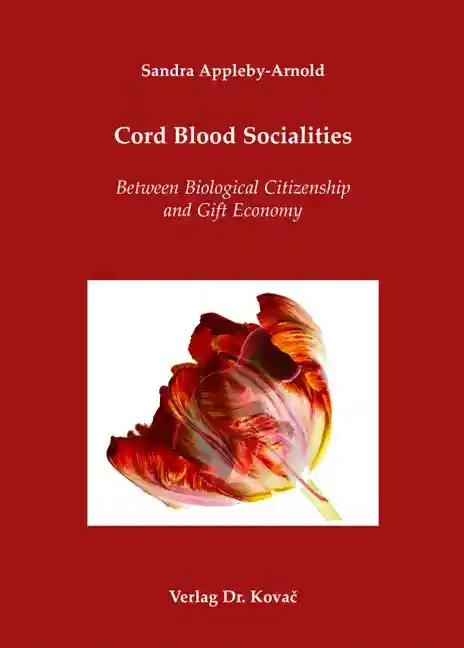Sandra Appleby-ArnoldCord Blood Socialities
Between Biological Citizenship and Gift Economy
SOCIALIA – Studienreihe soziologische Forschungsergebnisse, volume 125
Hamburg 2013, 274 pages
ISBN 978-3-8300-7393-2 (print)
ISBN 978-3-339-07393-8 (eBook)
About this book deutschenglish
In the last couple of years, the newborns’ umbilical cord blood has become increasingly accepted as a rich source of different types of stem cells. Similarly to stem cells from bone marrow, they have primarily been used for the treatment of leukaemia, and a number of serious genetic diseases. At the same time, scientists have been researching the potential of these cord blood stem cells in regenerative medicine and tissue engineering. The result has been a novel constellation of biotechnologies, knowledge production, institutions, categories of social actors and social practices which, in turn, made a lot of things shift: Healthcare systems, the hopes or fears of expectant parents, the knowledge monopoly of medical professionals and medical institutions and, ultimately, how different social actors imagine and construct responsibility, health provisioning and care.
Building upon the established concepts of biosociality, biological citizenship, gift economy and transnationalisation, the author develops the idea of a “bio-cosmopolitanism”: By merging a biomedical knowledge-based mode of distinction with an embodied practice, social actors embrace simultaneously the “gift to oneself”, the altruism towards anonymous patients, and the “donation” of potential scientific knowledge. As the author argues, they ultimately integrate a sense of biological global belonging into their everyday practices.
The study is based on extensive ethnographic field research in Germany and the United Kingdom, where the author conducted participant observation and numerous interviews in public as well as in private cord blood banks and hospitals. The result is a highly readable but, at the same time, very informative and thought-provoking book. It combines social theory with detailed description of the everyday routines and perceptions of all those who are involved in cord blood banking, lightened up by colourful “vignettes” with the author’s very personal insights. Hence, this book is addressed not only at scientific professionals but also at a non-academic readership. It can be seen as a pioneering work of cultural anthropology through which a new biomedical development and the mutual effects between such technology and societies become comprehensible – and alive.
Keywords
Biological citizenshipBiomachtBiopowerBiosocialityBiosozialitätCord bloodCosmopolitanismGift economyGouvernmentalitätGovernmantalityIdentitätIdentityKosmopolitismusKultur-/SozialanthropologieMedicalisationMedikalisierungMedizinanthropologieNabelschnurblutNichtwissenNon-knowledgeScience and Technology StudiesSpendenwirtschaftStammzellforschungStemcell researchSTSTransnationalisierungTransnationalismIhr Werk im Verlag Dr. Kovač
Möchten Sie Ihre wissenschaftliche Arbeit publizieren? Erfahren Sie mehr über unsere günstigen Konditionen und unseren Service für Autorinnen und Autoren.
